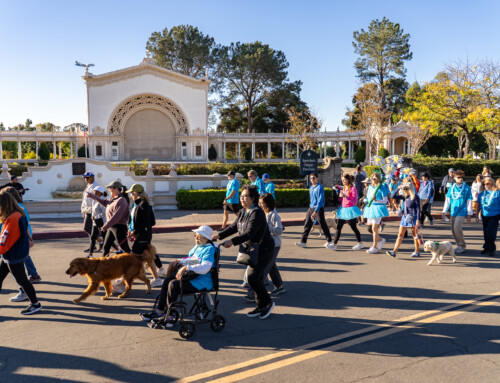 It can seem like there’s a new Alzheimer’s “breakthrough” almost every day. We sift through the headlines and pull together the relevant, reputable research updates for you. Here are 5 things you should know about Alzheimer’s and dementia research from the last month.
It can seem like there’s a new Alzheimer’s “breakthrough” almost every day. We sift through the headlines and pull together the relevant, reputable research updates for you. Here are 5 things you should know about Alzheimer’s and dementia research from the last month.
To learn about Alzheimer’s research in San Diego County, click here or contact Alzheimer’s San Diego at 858.492.4400.
1) Biogen Submits Aducanumab to FDA for approval as an experimental drug
Drug discovery giant Biogen announced plans to seek FDA approval of an experimental treatment it had previously ruled a clinical failure. Click here to read more.
2) China Approved Seaweed-Based Drug for Treatment of Alzheimer’s Disease
The seaweed-based drug, called Oligomannate made headlines for being approved in China as an experimental treatment in Alzheimer’s disease, prompting questions from clients here at Alzheimer’s San Diego. The company developing it says it is also seeking approval to market it abroad, with plans to launch clinical trials in the US and Europe in early 2020. It will be used for the treatment of mild to moderate Alzheimer’s. The drug aims to work by modulating the connection between the brain and the microbiome in the gut, which is a new direction in research.
A Phase Three trial of 818 patients with mild-to-moderate Alzheimer’s disease showed that oligomannate improved cognition by week 4, and positive results were sustained 9 months after treatment. The team behind the new drug said they were inspired to look into seaweed due to the relatively low incidence of Alzheimer’s among people who consume it regularly. The drug is just as effective as acetylcholinesterase inhibitors with fewer side effects.
Read more at Stat News, CNN, Medpage Today. Read Green Valley’s study here.
3) Alzheimer’s Memory Loss Reversed by New Head Device Using Electromagnetic Waves
NeuroEM Therapeutics announced findings from a clinical trial showing a reversal of cognitive impairment in Alzheimer’s disease patients after two months of treatment using wearable head device for in-home treatment. This treatment is not to be confused with Transcranial Magnetic Stimulation, which is offered by Kaizen Brain Center here in San Diego. TMS (like with Kaizen) uses magnetic waves that stimulate brain cells only in the brain’s outer cerebral cortex (in other words, it’s targeted). Transcranial electromagnetic treatment (TEMT) aims to penetrate the entire human brain to break up the toxic proteins, as treatment and prevention. This study used the electromagnetic treatment the same treatment twice daily for 1-hour through a head device. The device has multiple emitters positioned within a head cap that are activated sequentially, with treatments administered in-home by the patient’s caregiver.
Seven of the eight patients responded to treatment with a 4+ point increase in cognitive performance by the end of the 2-month treatment period. TEMT also showed effects on Alzheimer’s markers in blood and the cerebrospinal fluid around the brain. The investigators indicated they have strong evidence that TEMT is directly affecting the Alzheimer’s disease process by easily penetrating the brain and brain cells to break up aggregates of A-beta and tau. NeuroEM Therapeutics is planning to begin the recruitment of approximately 150 mild/moderate AD subjects later this year for treatment with the MemorEMTM device.
Read more at J-Alz, Medical Device Network, Science Alert.
4) Alzheimer’s disease: Brain immune cells may offer new treatment target
Brain immune cells, microglia, may offer a new treatment target. Brain scans of people with dementia show how microglia become more active and visible after tau tangles begin to form. Eliminating microglia in mice also reduced tau-related damage. Normally, tau is naturally occuring in the human brain, but too much tau is toxic. The recent research is showing that while microglia typically helps clear out toxicity in the brain, it can also cause damage to neighboring neurons as it’s trying to clear out the toxic element. In this particular study, mice were given a supplement that clears microglia in their brains. In comparison to controls, the mice who did NOT receive the supplement showed severe brain shrinkage. Further studies demonstrated that APOE4 triggered the presence of greater microglia.
Read more at Medical News Today and Science Daily read the original study at JEM.
5) Bill Gates Blog on Alzheimer’s Research
Bill Gates recently posted in his blog about common challenges in Alzheimer’s research, and proposals to overcome these challenges and better promote clinical trials to find a cure. Read the piece here.
Registries:
-
Cleveland Clinic Healthy Brains Registry (nationwide)—take an online brain health assessment and learn about brain health studies.
-
Alzheimer’s Prevention Registry (nationwide)—get information and updates about participating in future Alzheimer’s prevention trials.
-
GeneMatch (nationwide)—enroll to get matched to Alzheimer’s genetics studies.
-
Brain Health Registry (nationwide)—sign up for an online study of brain health and learn about possible research-study opportunities.
-
Alzheimer Prevention Trials (APT) Webstudy (nationwide)—enroll to track memory and thinking skills and learn about Alzheimer’s trials
-
ResearchMatch (nationwide)—Matches you with research studies. Researchers need both healthy people and people with all types of conditions






